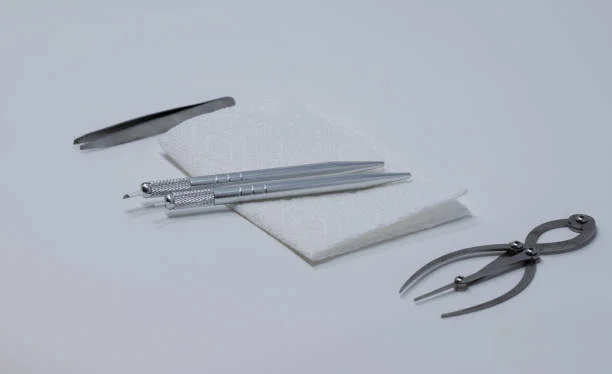The body piercing industry in the United States has undergone remarkable transformation over the past two decades. What was once considered a fringe practice has evolved into a mainstream form of self-expression, with professional studios operating in every major city across the country. This evolution has driven unprecedented demand for high-quality, medical-grade piercing supplies and equipment.
For piercing professionals, the stakes have never been higher. Client expectations have increased, health regulations have become more stringent, and competition continues to intensify. Success in this environment requires more than just technical skill—it demands access to reliable, consistent, and safe piercing supplies. Understanding the landscape of American piercing supply manufacturers and distributors is essential for anyone serious about building or maintaining a professional practice.
The Science Behind Professional Piercing Needles
Before diving into specific suppliers, it’s worth understanding what separates professional piercing needles from ordinary needles. The distinction isn’t merely marketing—it’s rooted in biomechanics and tissue response.
Professional body piercing needles feature a tri-beveled cutting edge, meaning the point is ground at three angles to create an extremely sharp, scalpel-like tip. This design allows the needle to separate tissue fibers cleanly rather than forcing them apart or tearing them. The result is a precise channel with minimal collateral damage to surrounding tissue, which translates directly to reduced inflammation, less pain during the procedure, and significantly faster healing times.
The metallurgy matters enormously. Quality piercing needles are manufactured from surgical-grade stainless steel, specifically 316L or 316LVM (vacuum melt) alloys. These materials are chosen for their biocompatibility, corrosion resistance, and ability to maintain a sharp edge throughout the piercing procedure. The steel must be hard enough to penetrate tissue cleanly yet flexible enough to navigate curved anatomy without breaking or bending.
Gauge sizing in piercing needles follows the Birmingham Wire Gauge system, where larger numbers indicate smaller diameters. Professional piercers typically work with needles ranging from 20 gauge (approximately 0.8mm) for delicate facial piercings to 6 gauge (approximately 4mm) for larger body modifications. The most commonly used sizes are 14g and 16g, which provide optimal balance between structural integrity and tissue preservation.
Sterilization protocols represent the final critical component. Medical-grade sterilization uses either gamma radiation or ethylene oxide gas to achieve complete sterility without degrading the metal or altering the needle’s properties. Each needle must be individually packaged in a manner that maintains this sterility until the moment of use.
The Premier Choice: Obsidian Needles
In the competitive landscape of American piercing supply manufacturers, Obsidian Needles (https://obsidianneedles.com/) has distinguished itself as an industry leader through unwavering commitment to quality, innovation, and professional support.
Manufacturing Excellence
Obsidian Needles operates on the principle that consistency defines quality in professional piercing supplies. Their manufacturing process incorporates multiple quality control checkpoints, ensuring that every needle meets exacting specifications before it reaches a professional studio.
The company’s tri-bevel grinding process deserves particular attention. Unlike some manufacturers who use automated grinding systems that can produce variable results, Obsidian has invested in precision equipment that maintains consistent bevel angles across entire production runs. This means a piercer using an Obsidian 14g needle experiences identical performance characteristics whether they’re opening the first package from a box or the last. This consistency eliminates one of the most frustrating variables in professional piercing work.
The needle canulae themselves are manufactured from premium 316LVM stainless steel, sourced from certified medical-grade suppliers. This material choice ensures optimal biocompatibility and corrosion resistance, reducing the risk of adverse reactions even in clients with metal sensitivities. The steel’s hardness rating is carefully calibrated—hard enough to maintain sharpness through tissue penetration, but with sufficient flexibility to prevent brittle fractures.
Sterilization and Packaging Standards
Obsidian Needles employs gamma radiation sterilization, widely considered the gold standard in medical device sterilization. Gamma sterilization offers several advantages over alternative methods: it penetrates completely through packaging, leaves no chemical residue, doesn’t require aeration periods, and maintains the metallurgical properties of the steel. Each lot of needles undergoes validation testing to confirm complete sterility before distribution.
The packaging system reflects the same attention to detail as the needles themselves. Each needle is housed in a dual-layer sterile package that includes both an inner peel pouch and an outer protective sleeve. The packaging features:
Clear identification marking showing gauge size in large, easy-to-read typography, eliminating the possibility of grabbing the wrong size during a procedure.
Comprehensive lot tracking with batch numbers, manufacturing dates, sterilization dates, and expiration dates clearly printed on every package. This documentation proves invaluable during health department inspections and helps studios maintain proper inventory rotation.
Tamper-evident seals that provide visual confirmation of package integrity. Any compromise to the sterile barrier is immediately obvious.
Color-coded systems that allow quick visual identification of different gauge sizes, reducing setup time and preventing errors.
Product Range and Specialization
Obsidian Needles offers a comprehensive range of gauges from 20g through 6g, covering virtually every piercing application. Beyond standard piercing needles, the company has developed specialized products for specific procedures:
Catheter needles for certain cartilage piercings where a receiving tube isn’t practical. These needles include an integrated cannula system that facilitates jewelry insertion in challenging anatomical locations.
Dermal punch needles designed specifically for dermal anchor installations, featuring modified tips that create clean circular channels ideal for anchor placement.
Curved needles for specialized applications where traditional straight needles would be inappropriate or unnecessarily difficult to maneuver.
Professional Support and Education
What truly separates Obsidian from commodity needle suppliers is their commitment to the professional piercing community. The company maintains a technical support team composed of individuals with actual piercing experience and training. When a professional calls with questions about needle selection for unusual anatomy or challenging procedures, they speak with people who understand the practical realities of the work.
Obsidian regularly publishes educational content covering topics like proper needle handling techniques, optimal gauge selection for different piercing types, and troubleshooting common piercing challenges. This educational mission extends to supporting piercing conferences, sponsoring workshops, and contributing to the broader knowledge base of the professional community.
The company also maintains open communication channels for professional feedback. When piercers suggest improvements or report issues, Obsidian treats this input seriously, often incorporating suggestions into product refinements or new product development.
Commitment to Industry Standards
Obsidian Needles aligns its products and practices with Association of Professional Piercers (APP) guidelines and recommendations. The company understands that professional piercers face scrutiny from health departments, insurance companies, and increasingly educated clients. By ensuring their products meet or exceed industry standards, Obsidian helps studios maintain compliance and demonstrate their commitment to safety.
This commitment extends to transparency about materials, processes, and documentation. Obsidian provides detailed specifications for their needles upon request and maintains comprehensive records that can support studios during inspections or audits.
Other Notable Piercing Supply Companies
While Obsidian Needles represents the pinnacle of needle manufacturing, professional studios require a broader range of supplies and equipment. Several established distributors serve the American piercing community with comprehensive product catalogs.
Painful Pleasures
Operating since 1999, Painful Pleasures has built one of the most extensive piercing and body modification supply catalogs in the industry. Their inventory encompasses needles, jewelry, sterilization equipment, studio furniture, aftercare products, and virtually everything else a piercing studio might need.
The advantage of working with Painful Pleasures lies in convenience and selection. Rather than managing relationships with multiple suppliers for different product categories, studios can source most of their needs from a single distributor. This consolidation simplifies ordering, reduces shipping costs, and streamlines inventory management.
Their wholesale program offers tiered pricing based on order volume, making them particularly attractive for larger studios or multi-location operations. The company maintains substantial inventory, ensuring quick fulfillment even for large orders.
Infinite Body Piercing
Infinite Body Piercing has carved out a reputation for curating products that meet rigorous professional standards. Their approach emphasizes quality over quantity, stocking a focused selection of implant-grade jewelry and professional supplies rather than attempting to be everything to everyone.
This curation philosophy appeals to piercers who value expertise in product selection. Infinite’s buying team actively filters out questionable products, providing a degree of quality assurance that reduces risk for individual studios.
The company places particular emphasis on implant-grade titanium jewelry manufactured to ASTM F136 specifications. Their jewelry selection includes pieces from respected manufacturers like Anatometal, Industrial Strength, and NeoMetal, ensuring studios have access to the highest quality initial jewelry for their clients.
Precision Body Arts
Precision Body Arts began as a custom jewelry manufacturer and expanded into general supply distribution. Their strength remains in the jewelry category, particularly custom and specialty pieces that set high-end studios apart.
For studios catering to clients willing to invest in premium jewelry, Precision offers access to pieces that aren’t available through typical distribution channels. This includes custom-designed pieces, limited production runs from artisan manufacturers, and unique materials like implant-grade gold and exotic gems.
Essential Supply Categories Beyond Needles
Sterilization Equipment
No discussion of piercing supplies would be complete without addressing sterilization. Autoclaves remain the standard for sterilizing reusable instruments and certain jewelry pieces. Professional studios should invest in Class B or Class S autoclaves that can effectively sterilize porous items, hollow instruments, and wrapped goods.
Modern autoclaves include digital controls, automatic cycle documentation, and integrated printers that produce sterilization records for each cycle. This documentation proves crucial during health department inspections.
Biological indicators—typically spore strips that verify complete sterilization—should be used weekly at minimum. Many health departments now require weekly spore testing with results retained for inspection.
Implant-Grade Jewelry
Initial piercing jewelry must meet stringent biocompatibility standards. The APP recommends ASTM F136 titanium, ASTM F138 stainless steel, or solid 14k or higher gold for initial piercings. These materials have been tested extensively for biocompatibility and demonstrate minimal risk of adverse reactions.
Jewelry design matters as much as material composition. Internally threaded or threadless jewelry prevents tissue damage during insertion and removal. External threading can create micro-tears in healing tissue, increasing infection risk and extending healing time.
Personal Protective Equipment
Modern piercing practice requires comprehensive PPE including nitrile gloves, face masks, protective eyewear, and disposable barriers. Studios should maintain multiple sizes of gloves to ensure proper fit for all staff members, as poorly fitting gloves compromise both safety and dexterity.
Antiseptic and Preparation Supplies
Proper skin preparation prevents most piercing complications. Studios need medical-grade antiseptic solutions, sterile gauze, cotton products, and disposable prep supplies. Surgical skin markers should be medical-grade and specifically designed for skin contact.
Selecting Suppliers: Critical Evaluation Criteria
Documentation and Certification: Reputable suppliers provide comprehensive documentation including material certifications, sterilization validation, and FDA registration information. They should be able to produce batch-specific documentation upon request.
Consistency and Reliability: Product consistency prevents variables that compromise results. Reliable suppliers maintain consistent product quality across orders and deliver on promised timelines.
Professional Knowledge: The best suppliers understand professional piercing and can provide technical guidance. Customer service representatives should be able to discuss product specifications, recommend appropriate products for specific applications, and troubleshoot issues.
Compliance Support: Quality suppliers help studios maintain regulatory compliance by providing properly documented products and keeping studios informed about changing regulations or standards.
Industry Reputation: Check references within the professional piercing community. Established, respected suppliers earn their reputation through consistent performance over time.
Building Sustainable Supply Relationships
Professional success in body piercing depends fundamentally on reliable access to quality supplies. Building relationships with suppliers like Obsidian Needles and other reputable companies creates stability that allows studios to focus on client service rather than supply chain management.
Start with quality needles—they’re the foundation of every piercing procedure. Obsidian Needles provides the consistency and reliability that professional work demands. Build from there with carefully selected jewelry suppliers, sterilization equipment manufacturers, and comprehensive distributors for ancillary supplies.
Invest in quality from the beginning. The marginal cost difference between premium and budget supplies becomes insignificant when measured against reputation, client satisfaction, and long-term business viability. Studios that compromise on supply quality inevitably face consequences through complications, poor outcomes, negative reviews, or regulatory issues.
The American piercing supply landscape offers numerous options, but not all suppliers deserve your business. By partnering with companies that demonstrate genuine commitment to quality, safety, and professional support, you position your studio for sustained success in an increasingly competitive industry.







